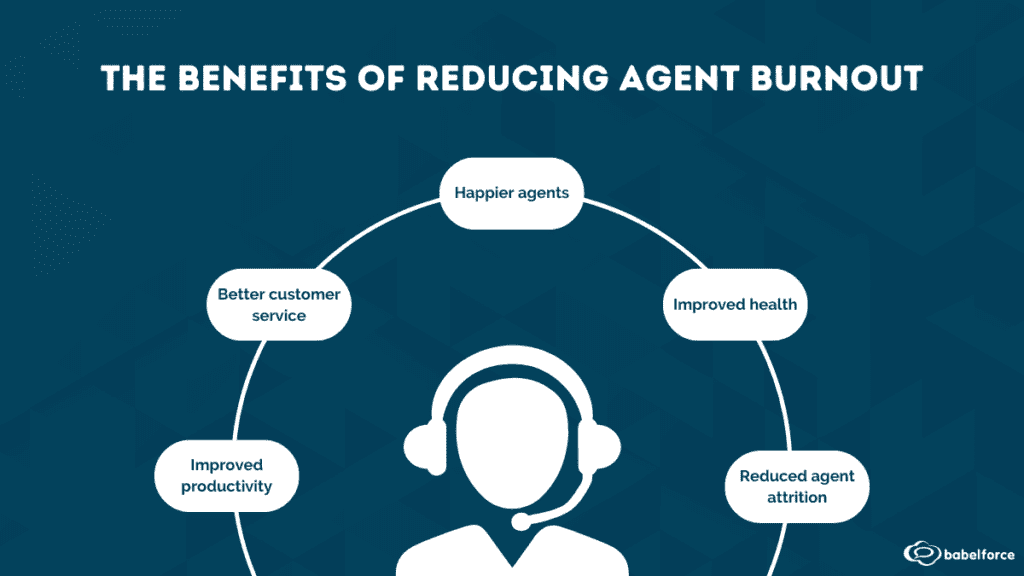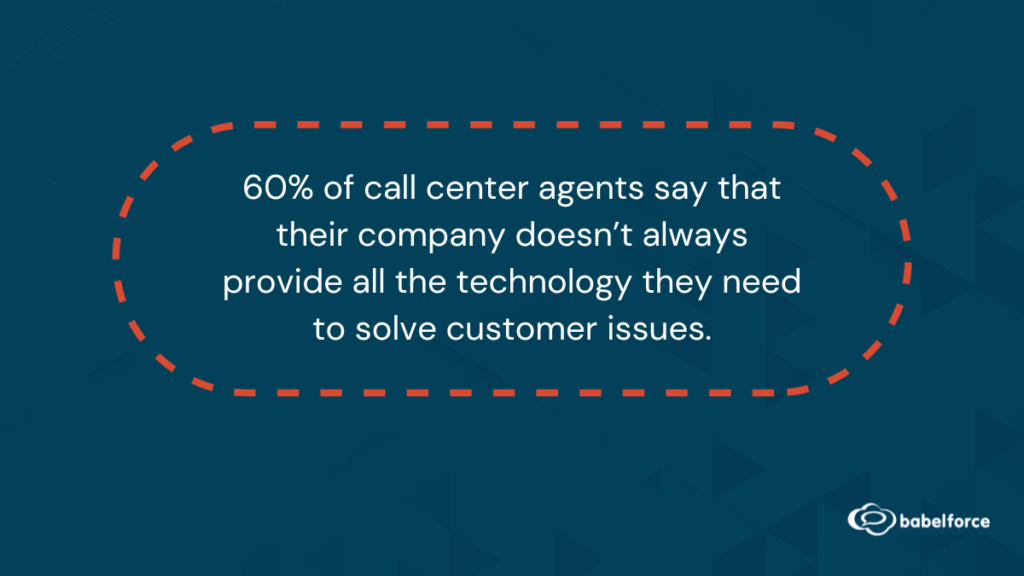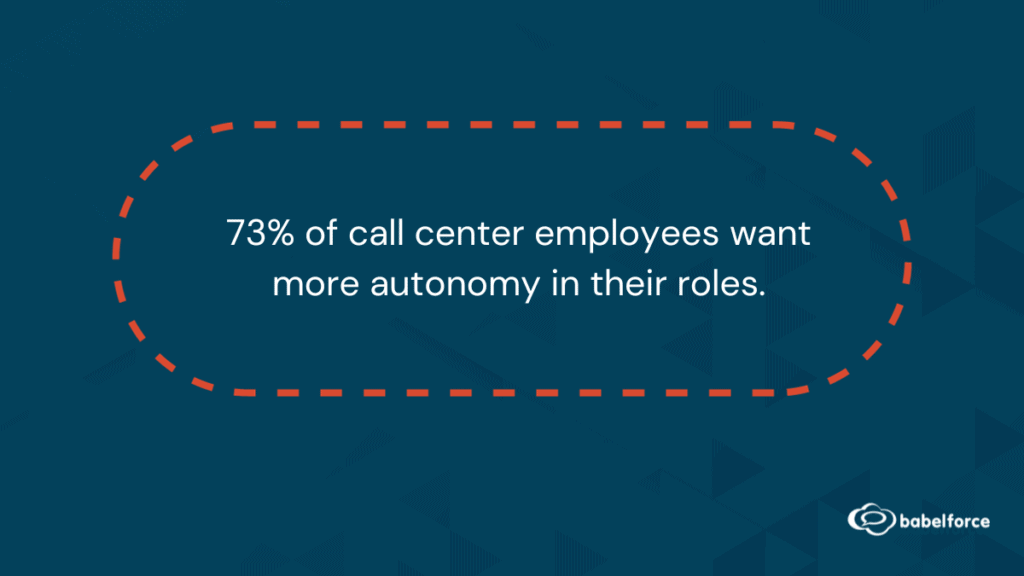Burnout. According to a recent report by Gallup, 76% of workers will experience burnout at some point in their job. But for call centers, burnout is especially common. It contributes to the industry’s notoriously high agent attrition rates, which averaged around 38% in 2022.
When questioned, 62% of call center agents identified burnout as one of their top workplace challenges. It’s estimated that the cost of replacing a single agent is anywhere between $5,000 to $7,500. But what exactly is agent burnout? And more importantly, how can we prevent it? We break it down in this article.
Read on for:
• What is Agent Burnout?
• Why is Preventing Agent Burnout Important?
• How to Prevent Agent Burnout
• Happy Agents means Happier Customers
What is Agent Burnout?
Agent burnout refers to the physical, emotional, or mental exhaustion experienced by contact center agents. There are many factors that contribute to agent burnout, including prolonged, repetitive work paired with emotional stress from dealing with difficult customers, stringent KPIs, and inadequate resources.

It can lead to a decrease in job performance, cynicism, feelings of detachment, and health problems. Ultimately, most agents who experience continuous burnout will end up leaving their jobs. And who can blame them!
Why is Preventing Agent Burnout Important?
Preventing burnout is important for both agents and employers. For agents, it means reduced stress and a better quality of life. It also benefits employers – by helping their agents to remain engaged and motivated in the workplace. This translates to:
- Greater productivity. A happy and healthy agent is naturally more productive. Think about it, if you hate what you do for 8 hours a day, 5 days a week, would you be motivated to give your best? Probably not, and this is why it’s important to ensure your agents aren’t burning out.
- Better customer experiences. Satisfied, productive agents lead to happy customers. If an agent is stressed out, it’s natural for their patience and attitude with customers to suffer. Keeping agents happy means they’re more likely to provide customers with the high quality service they expect.
- Lower attrition. Agent attrition is one of the most expensive costs for call centers and can be a major headache to deal with. Preventing burnout helps to reduce attrition, which means more money saved on recruitment and training new staff members.
- Less absenteeism. Burnout and absenteeism are tightly linked; when agents are burnt out, they’re more likely to take unplanned days off. This can have a knock-on effect on the rest of the team, as it means they need to pick up the slack. As a result, you can end up with a continuous cycle that only leads to further burnout.
Preventing burnout can make a measurable impact on a call center’s bottom line.
How to Prevent Agent Burnout
Burnout might be a complex problem but it’s solvable. Call center managers can proactively take steps to prevent burnout among their agents. Here are some important steps you can take below.

Start Focusing on Agent Wellbeing
According to the Call Centre Management Association (CCMA), there are four core ingredients to agent wellbeing. These are:
- The feeling of being in control
- An appropriate work-life balance
- Good time management
- The ability to work to one’s own capacity.
Tackling these issues will go a long way towards preventing burnout. Look at it as an investment in your business – if you focus on taking care of your agents, they’ll take great care of your customers.
Empower Agents with Access to the Information They Need
One major stressor for agents is not having the right information at the right time. In fact, 60% of call center agents say that their company doesn’t always provide all the technology they need to solve customer issues. Integrating a contact center solution like babelforce with your CRM can give agents instant access to customer history, preferences, and more. It’ll allow them to assist customers more efficiently with less stress.

Factor in Breaks and Flexible Working Arrangements
Allowing agents to work flexible hours in addition to providing regular breaks, can do a lot for their well-being. In the CCMA’s 2023 survey, they identified a lack of sufficient breaks as having the biggest impact on agent energy and general welfare. Taking care of your staff in this way helps increase their focus while they’re working, which also positively impacts productivity and job satisfaction.
Give Your Agents More Autonomy
According to one study, 73% of agents want more autonomy in their jobs. Being micromanaged can be a major source of stress. Try to give agents more leeway in their jobs and create an environment where they feel trusted and respected. With enough freedom to make decisions for themselves, they’ll start developing important problem-solving skills that make for great leaders.

It’s a win-win both personally and for the company.
Eliminate Toxic Workplace Behavior
The McKinsey Health Institute ran a survey last year on employee burnout which revealed that 70% of workers cited “toxic workplace behavior” as the number one contributor to their burnout symptoms.
But what defines toxic behavior? McKinsey defines this as:
“interpersonal behavior that leads to employees feeling unvalued, belittled, or unsafe, such as unfair or demeaning treatment, non-inclusive behavior, sabotaging, cutthroat competition, abusive management, and unethical behavior from leaders or coworkers.”
To tackle this issue, it’s essential to have clear policies in place that outline the expectations and consequences for workplace behavior. Employers should create an environment where people feel comfortable speaking up if they witness or experience toxic conduct. This could include holding regular open forums where employees can discuss concerns without fear and implementing anonymous feedback systems, such as suggestion boxes or surveys, to capture genuine feedback.
Pay a Fair Wage
Perhaps not surprisingly, there is a link between burnout and wages. Agents who have had to cut back on their essential spending, are 2.5 times more likely to report at least one symptom of burnout. And while call centers may be reluctant to stretch budgets for higher pay, they need to consider the overall cost of agent burnout and attrition. It usually ends up costing the company more in the long run.
Happy Agents Means Happier Customers
Agent burnout can have a ripple effect on the entire contact center’s performance and customer satisfaction. The good news is, with awareness and some proactive steps, it’s entirely preventable. Studies have shown that happy employees are 13% more productive than their unhappy counterparts. And if you’re prioritizing agent well-being, then you’re prioritizing your customers too.
Happy and energized agents are better equipped to handle customer issues and inquiries. They’re more likely to go the extra mile and create those delightful customer experiences that people remember and are eager to share with others. A contact center where agents are respected, trusted, and supported is a place where all stakeholders can benefit.





